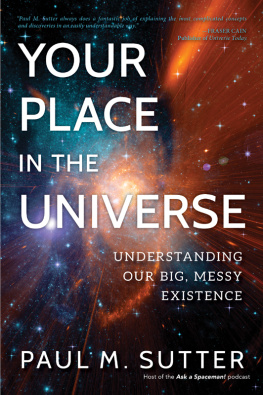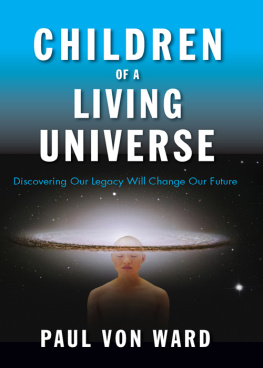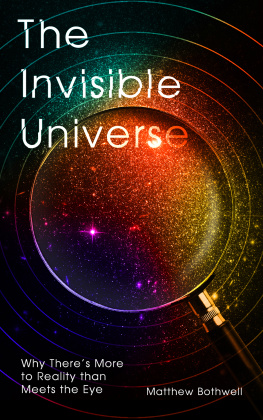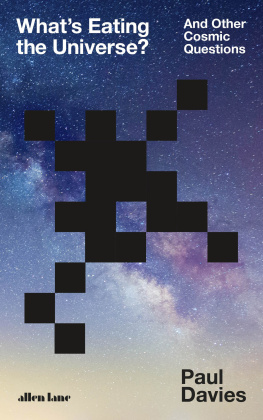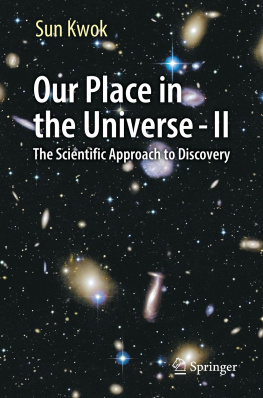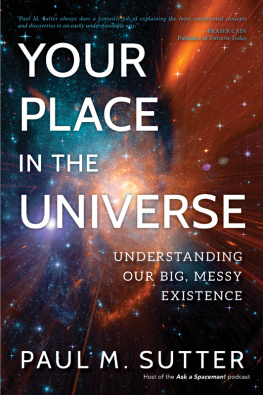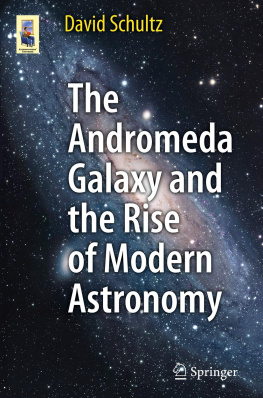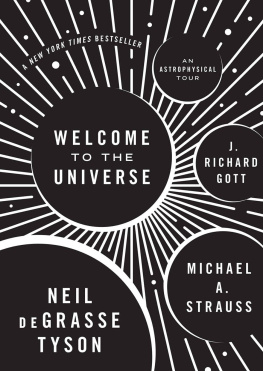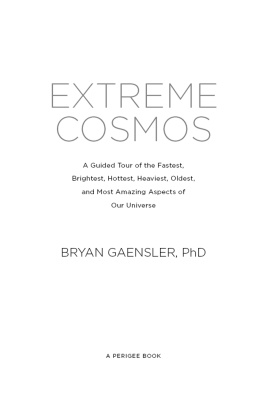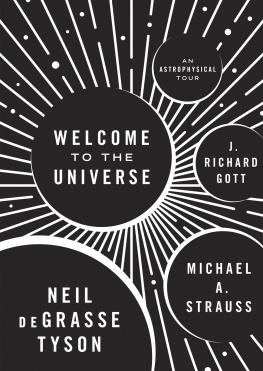
Adams, Fred C., and Greg Laughlin. The Five Ages of the Universe: Inside the Physics of Eternity. New York: Free Press, 2000.
Bartusiak, Marcia. The Day We Found the Universe. New York: Pantheon, 2009.
Berlinski, David. Newton's Gift: How Sir Isaac Newton Unlocked the System of the World. New York: Free Press, 2000.
Carroll, Sean. The Particle at the End of the Universe: How the Hunt for the Higgs Boson Leads Us to the Edge of a New World. Boston: Dutton, 2013.
Cox, Brian, and Jeff Forshaw. The Quantum Universe: Everything That Can Happen Does Happen. London: Allen Lane, 2011.
Davies, Paul. The Eerie Silence: Renewing Our Search for Alien Intelligence. Boston: Mariner, 2010.
Ferguson, Kitty. Tycho & Kepler: The Unlikely Partnership That Forever Changed Our Understanding of the Heavens. New York: Walker, 2002.
Feynman, Richard P. The Character of Physical Law. Cambridge, MA: MIT Press, 1964.
Garrett, Katherine, and Gintaras Dda. Dark Matter: A Primer. Advances in Astronomy (2011): http://dx.doi.org/10.1155/2011/968283.
Gates, Evalyn. Einstein's Telescope: The Hunt for Dark Matter and Dark Energy in the Universe. New York: W. W. Norton, 2010.
Gott, J. Richard. The Cosmic Web: Mysterious Architecture of the Universe. Princeton, NJ: Princeton University Press, 2016.
Greene, Brian. The Fabric of the Cosmos: Space, Time, and the Texture of Reality. London: Penguin, 2005.
Gregory, Stephen, and Laird Thompson. The Coma/A1367 Supercluster and Its Environs, Astrophysical Journal 222, no. 3 (1978): 78499.
Guth, Alan. The Inflationary Universe: Quest for a New Theory of Cosmic Origins. New York: Vintage, 1998.
Hawking, Stephen W. A Brief History of Time: From the Big Bang to Black Holes. New York: Bantam, 1988.
Hirschfeld, Alan. Parallax: The Race to Measure the Cosmos. New York: Henry Holt, 2001.
Koestler, Arthur. The Sleepwalkers: A History of Man's Changing Vision of the Universe. London: Penguin, 1959.
Kolb, Edward. Inner Space/Outer Space: The Interface between Cosmology and Particle Physics. Chicago: University of Chicago Press, 1986.
Krauss, Lawrence, and Robert Scherrer. The Return of a Static Universe and the End of Cosmology. General Relativity and Gravitation 39, no. 10 (2007): 154550.
Kristeller, Paul Oskar. Renaissance Thought: The Classic, Scholastic, and Humanist Strains. New York: Harper & Row, 1961.
Lattis, James M. Between Copernicus and Galileo: Christopher Clavius and the Collapse of Ptolemaic Cosmology. Chicago: University of Chicago Press, 1994.
Mahon, Basil. The Man Who Changed EverythingThe Life of James Clerk Maxwell. Hoboken, NJ: Wiley, 2003.
Nicolson, Iain. Dark Side of the Universe: Dark Matter, Dark Energy, and the Fate of the Cosmos. Baltimore: Johns Hopkins University Press, 2007.
Omns, Roland. Understanding Quantum Mechanics. Princeton, NJ: Princeton University Press, 1999.
Pais, Abraham. Inward Bound: Of Matter and Forces in the Physical World. Oxford: Oxford University Press, 1986.
Panek, Richard. The 4 Percent Universe: Dark Matter, Dark Energy, and the Race to Discover the Rest of Reality. Boston: Mariner Books, 2011.
Reston, James, Jr. Galileo: A Life. Washington, DC: Beard Books, 2000.
Ronan, Colin A. Edmond Halley: Genius in Eclipse. Garden City, NY: Doubleday, 1969.
Silk, Joseph. The Big Bang. 3rd ed. New York: Henry Holt, 2002.
Stephenson, Bruce. The Music of the Heavens: Kepler's Harmonic Astronomy. Princeton, NJ: Princeton University Press, 1994.
Stone, A. Douglas. Einstein and the Quantum. Princeton, NJ: Princeton University Press, 2013.
Tasker, Elizabeth. The Planet Factory: Exoplanets and the Search for a Second Earth. New York: Bloomsbury Sigma, 2017.
Thorne, Kip S. Black Holes and Time Warps: Einstein's Outrageous Legacy. New York: W. W. Norton, 1995.
Weinberg, Steven. Dreams of a Final Theory: The Search for the Fundamental Laws of Nature. London: Hutchinson Radius, 1993.
Weinberg, Steven. The First Three Minutes. New York: Basic Books, 1993.

Of course the Earth is at the center of the universe. Just look at the evidence. The sun, moon, stars, and planets all wheel around us in the great celestial dance; how are we possibly to make sense of that if we're not at the focal point? And have you seen the Earth? It's large and solid and made of rockare you seriously suggesting it moves?
Look up in the sky. Birds. Clouds. The wind. All moving effortlessly, right? They are well removed from this immobile rock on which we stand, so it stands to reason that movement comes even more naturally to the stars and planets, even further removed from us.
Besides, things up there are just so different. Our lives here on Earth are dirty, chaotic, even sinful. But the graceful movements of the heavenly realm are something else. Motions so precise we can use them to set our calendars. Unfailing, the same stars appear on the horizon at the precise time they did last year, and the year before, and so on into the unwritten time of our ancestors.
Surely the laws of nature that we understand here on Earth don't apply up there. They have their own rules, their own sets of laws that govern their behavior. The heavens surround us but are separate from us.
Oh, what about those comets and meteors? Surely they're just strange atmospheric phenomena. Don't worry too much about those.

Can we really blame our forebears for thinking we are at the center? Up until a few hundred years ago, it was the simplest and most natural explanation of the available data. Not only that, it was supported by rational, coherent arguments. Our ancestors, as we do, used multiple paths to understand the world around themevidence-based, faith-based, reason-based, math-basedall of which pointed in the same direction: out.
Our ancestors were no dummies. They were just as smart as we are today and perfectly capable of understanding the world around them. And astronomy was vitally important to their daily lives: when to plant crops, when to reap the harvest, when to start preparing for campaigns, when to celebrate holidays. Humans have been using calendars for millennia (at least!), and the natural, regular, repeatable, predictable movements of the heavens provided the perfect device.
I suppose I should mention that ancient peoples thought that the stars influenced our daily lives toonot just by proxy through the effects of the seasons, but literally determined our fate. It's a unique perspective that's missing from modern scientific perspectives (with good reason, and I'll get to that in a bit). But again, I have to stress that your extremely-great-grandparents regarded their horoscope with as much seriousness as they could muster.
The motions of the stars and planets were connected to the seasons. So even though the celestial realm obeys its own set of laws, it must surely be connectedsomehowto events here on Earth. And despite the messiness and chaotic nature of our home, there's a sense of some sort of hidden order and regularity behind our lives. There are obvious patterns in nature, so perhaps there are unobvious patterns as well, patterns that can only be teased out by careful observation and interpretation.
Next page
